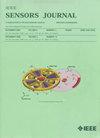A Novel Cascaded Extended Kalman Filter for Error Compensation in Magnetic Angle Sensors
IF 4.3
2区 综合性期刊
Q1 ENGINEERING, ELECTRICAL & ELECTRONIC
引用次数: 0
Abstract
Conventional magnetic angle sensors mostly use a bipolar magnet structure, which shows a relative low resolution and accuracy due to nonuniform magnetization, mechanical errors, and electrical errors. To address these issues, a novel magnetic angle sensor is designed by adopting structure with a central bipolar magnet (BPM) and an annular multipolar magnet (MPM). The central bipolar magnet is responsible for coarse positioning, while the annular multipolar magnet is used for fine angular measurement. To enhance the accuracy of the novel magnetic angle sensor, a cascaded extended Kalman filter (CEKF) is proposed to process and fuse the measurement data from both the central bipolar magnet and the annular multipolar magnet. This algorithm effectively fuses the magnetic field data from both types of magnets, thereby addressing the angle jump issue that can occur when the multipolar magnet transitions across adjacent poles and improving the overall measurement accuracy. Under various working conditions such as constant speed, constant acceleration, and static, the angle measurement error can be stably maintained within 0.1°, indicating that the proposed method has high robustness and accuracy.求助全文
约1分钟内获得全文
求助全文
来源期刊

IEEE Sensors Journal
工程技术-工程:电子与电气
CiteScore
7.70
自引率
14.00%
发文量
2058
审稿时长
5.2 months
期刊介绍:
The fields of interest of the IEEE Sensors Journal are the theory, design , fabrication, manufacturing and applications of devices for sensing and transducing physical, chemical and biological phenomena, with emphasis on the electronics and physics aspect of sensors and integrated sensors-actuators. IEEE Sensors Journal deals with the following:
-Sensor Phenomenology, Modelling, and Evaluation
-Sensor Materials, Processing, and Fabrication
-Chemical and Gas Sensors
-Microfluidics and Biosensors
-Optical Sensors
-Physical Sensors: Temperature, Mechanical, Magnetic, and others
-Acoustic and Ultrasonic Sensors
-Sensor Packaging
-Sensor Networks
-Sensor Applications
-Sensor Systems: Signals, Processing, and Interfaces
-Actuators and Sensor Power Systems
-Sensor Signal Processing for high precision and stability (amplification, filtering, linearization, modulation/demodulation) and under harsh conditions (EMC, radiation, humidity, temperature); energy consumption/harvesting
-Sensor Data Processing (soft computing with sensor data, e.g., pattern recognition, machine learning, evolutionary computation; sensor data fusion, processing of wave e.g., electromagnetic and acoustic; and non-wave, e.g., chemical, gravity, particle, thermal, radiative and non-radiative sensor data, detection, estimation and classification based on sensor data)
-Sensors in Industrial Practice
 求助内容:
求助内容: 应助结果提醒方式:
应助结果提醒方式:


